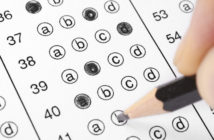With the global pandemic, testing organizations had canceled many of their exams like the AP, IB, and SAT exams. Despite this, language proficiency tests are still mandatory if you want to study abroad. The TOEFL test is one of the most popular language examinations with tens of thousands of people taking it in Beijing each year. The test has become more critical in recent years, since it is the only way to evaluate an applicant’s academic abilities apart from their GPA. Tons of people sign up for TOEFL prep courses in Beijing, often spending more than RMB 10,000. Is this necessary? How do you pick the right course?
Choosing a course
If you think carefully, there are two different types of TOEFL prep courses. The first focuses on English concepts and skill development, while the other focuses on TOEFL test-taking skills. Although most courses are a combination of the two, each will lean towards a general direction you can figure out by looking at their specific course schedule. Below is a chart contrasting the two different types of courses. Again, it’s essential to think carefully before making your decision.
| Developing English abilities for the test (基础班 usually) | Developing test-taking skills (冲刺班 usually) |
| Usually long-term courses | Usually short courses |
| Focuses on the English language | Focuses on the test itself and the most efficient ways to answer the questions |
| Choose this type when you are younger and need to learn more English anyways. | Choose this type when your English is good enough for the test but still needs a few tips and tricks to maximize your score. |
| Choose this type when you are taking the test in a few years. | Choose this type when you are taking the test in a few months or weeks. |
I interviewed Ella Li, a student at JPED Academy, to find out if these courses are actually worth the time and money.
Does the course you take lean towards English ability or test-taking skills.
A mix between both, but leaning towards test-taking.
What is one thing the course made you do?
I needed to memorize three lists of TOEFL words every day, and I went to the teacher to check the words.
Do you think memorizing words really works?
The institution will not ask to apply it in practice, so I think it’s not so necessary to memorize the words.
Do you think prepping for the test is worth it?
Yes, the course gave me insight into the questions that will appear and taught me different methods to complete the questions quickly and correctly. Though I don’t approve of how they made students dully memorize vocabulary words.
TOEFL prep may be useful for Ella, but Amber Yao, a student at Tsinghua International, School says otherwise.
According to Amber: “TOEFL courses are not helpful for improving my scores because it’s different from the tests that I actually practiced. They are just adding pressure and causing anxiety. The template for the speaking test they made me follow is not how I can get my points and they are not effective for the actual test. And as for reading, the teachers only let me translate sentences into Chinese and didn’t let me know how to answer the questions.”
Memorizing vocabulary words
No matter which TOEFL course you take, chances are they are going to make you memorize a lot of words. This may be unnecessary, since the chances of seeing one of the words you memorized is quite slim. In addition, learning to recognize the words is different from learning how to apply them. For me, if you don’t know how to use all the words you memorized, it’s going to be a waste of time. Because of this, forcing your brain to remember words is completely unnecessary. Instead, learning words through flexible methods like reading and writing is the better option. This is one of the most critical reasons some would argue that prepping courses are not worth it.
Why is my diagnostic test score so low?
Most test prep institutions will use this tactic when you take your diagnostic test before signing up for the course to understand your abilities better. Though the intention is excellent, there are things to keep in mind. Some institutions will intentionally lower your diagnostic score (using more rigorous reading materials, grading the speaking and writing section harshly, etc.) to create the illusion that you need more test prepping. They aim to create stress and tension so that you are more likely to sign up for their course. This happened to me once. When I took a mock TOEFL exam provided by a test prep institution, I got a total score of 101/120, but in reality, I got 115/120 on the actual test. With that being said, take it with a grain of salt and don’t feel discouraged or pressured.
Final Tips and Tricks
- If you want to sign up for a TOEFL prep course, carefully evaluate your current situation and the course’s structure before making the decision.
- Study for the test in a noisy room to train yourself to adapt to the actual testing environment. Hundreds of people are taking the actual test simultaneously, and trust me when I say it sounds like the zoo.
- Familiarize yourself with the test’s structure, so you know what to expect.
TOEFL prep courses can be helpful, but you will have to carefully select which course you want to attend based on your current situation. Even though they might ask you to memorize words, try to learn vocabulary through different methods. After you have enrolled, take your diagnostic test with a grain of salt. At last, study in a noisy area and familiarize yourself with the testing environment as well as the test’s structure. I’m sure you will do great!
Images: Unsplash






